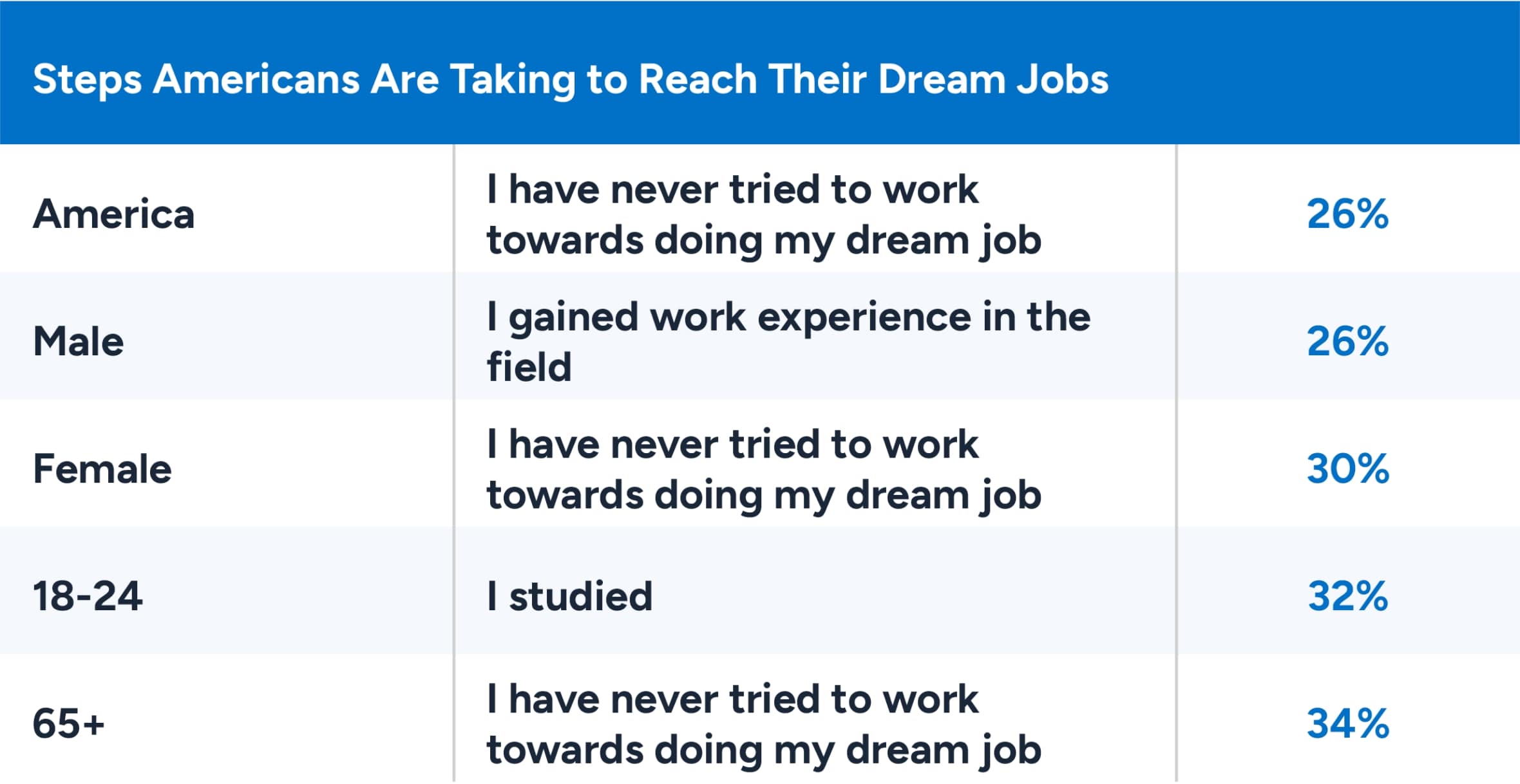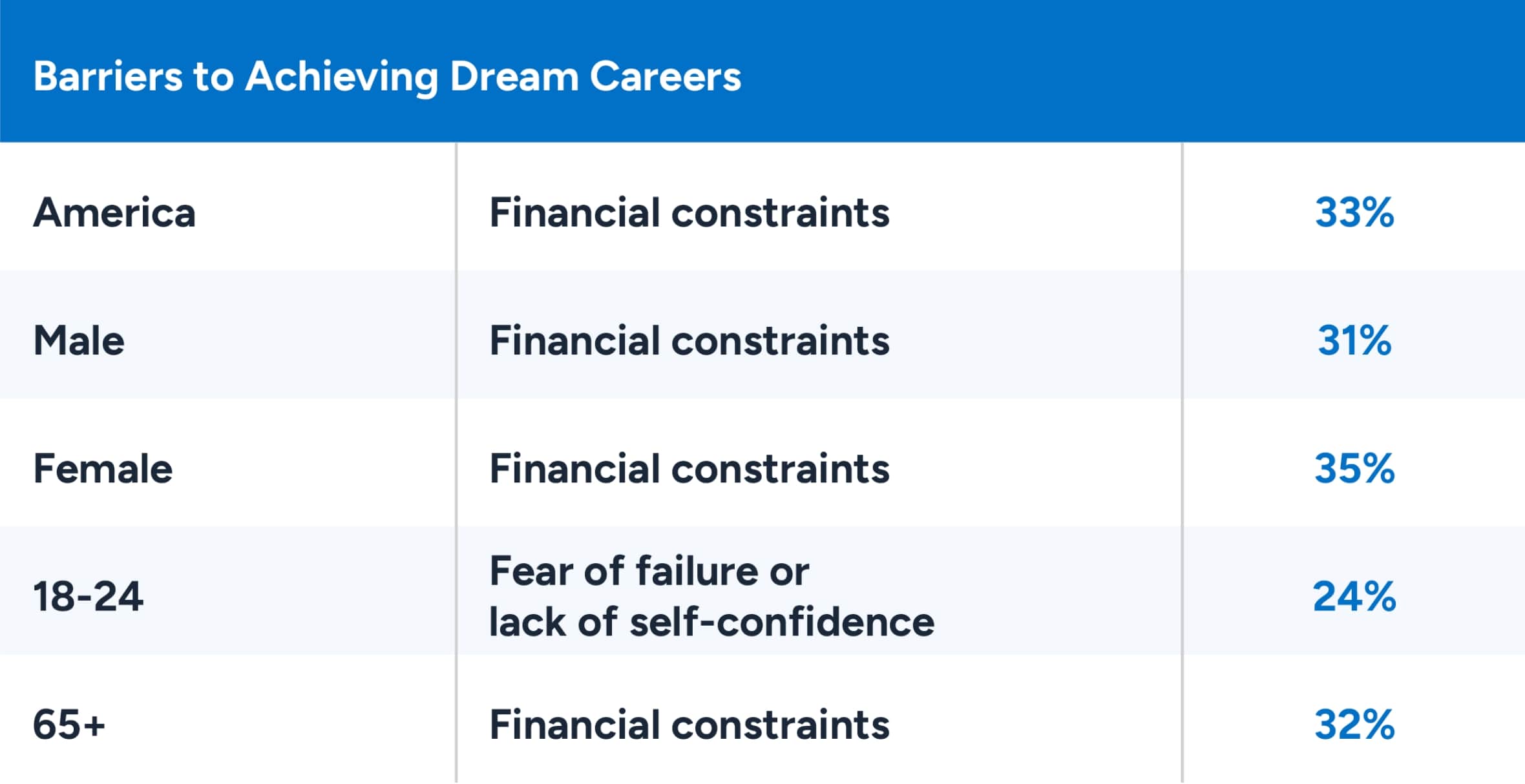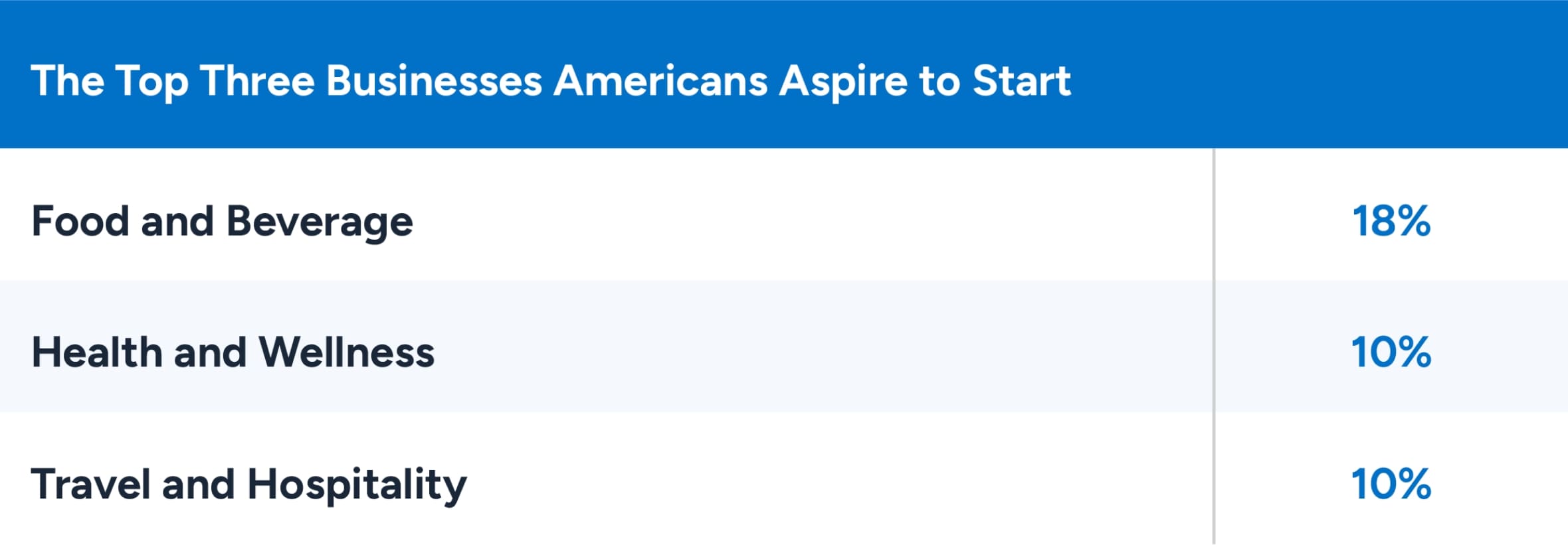Whether you grew up living in the heart of a bustling American city or were raised amongst the quaint peace and quiet that comes with rural living, we all had a dream job we wanted to go into when we were younger – even if some of them may have been a little fanciful.
And yet, even though some dream jobs, such as becoming an astronaut or a spy, are a lot tricker to achieve than others, for most of us, there was a pretty high probability after school or university that we could step into our dream jobs just a few years after graduation.
But, with that being said, just how many of us Americans took those necessary steps to make our dream jobs a reality? Just how many Americans go on to achieve the dream job from their childhood?
To find out, we carried out a survey across America asking people what their dream job was, whether or not they took steps to make such employment a reality, and what barriers got in the way of their goals.
Read on to find out what we discovered.
What percentage of Americans go on to achieve their dream job?
Despite the potential for many of us to eventually take on that one job we’ve been envisioning doing since childhood, it would seem that, for the vast majority of Americans, this simply isn’t something that appears to happen very often.
Whether due to financial necessity, additional family commitments, or simply the decision to walk a different path, stats show that only a tiny fraction – 8% to be exact – of Americans we surveyed were actually doing the job they’d always dreamed of.
However, based on the data provided from our survey, there may be a very good reason for this. Below, is a breakdown of our survey’s core 5 questions, and how they reflect the difficulties that tend to occur to prevent most of us from achieving the career of our dreams:
1. What was your dream job?
Starting by examining the main question of our survey, we first asked our respondents what their dream job was. And it turns out the overwhelming answer in almost all areas was to become an entrepreneur.
Indeed, roughly 9% of those we spoke to stated they wished to be an entrepreneur, including 10% of men and 18–24-year-olds, as well as 9% of women. This was then closely followed by 7% wanting to be musicians, and 5% to be a pro-athlete. In fact, the only real point of difference was that those aged 65+ would rather have been teachers (9%)
Already then, our survey makes it clear just how difficult it can be to achieve the most common dream jobs in America. While becoming an entrepreneur is certainly viable, it is no easy task, and that’s to say nothing of just how hard it is to become a full-time musician and athlete.
In other words, the dream jobs for most Americans are often the ones with the smallest job pool and closest competition. This certainly helps to explain the low percentage of dream job success, though it’s not the only factor.
2. What inspired your dream job choice?
Moving on to question two, we asked our respondents to tell us what inspired their choice of dream job. Was it merely a hobby they started with, or was there a big name in the industry that got them eager to try?
Well, starting with the former first, roughly 28% of Americans claim the desire for their idealized job came from a personal passion or hobby, with it coming top for 26% of men and 30% of women.
This was then followed by a further 27% stating that certain personal or life events had a major impact on making the decision, while another 14% said it was down to family influence.
As it turns out, only 10% and 9% said it was down to a TV influence or celebrity role model – though with the rise of social media influences, this could be subject to change in the future.
Regardless, this high percentage of Americans finding their dream job through their passion stands in clear contrast to the number of Americans that actually go on to achieve said dream, as you would arguably expect such a core reasoning to inspire people to get started, so why is this percentage comparison so low?
3. What steps have you taken to achieve your dream job?
Sadly, although a substantial number of those we spoke to had the fire of a life-long passion or hobby behind making their ideal job a reality, the vast majority of people never took the first step required to achieve said desired employment.
As it turns out, a full 26% of those who responded to our survey stated they had never tried to work towards their dream job, though a further 23% stated they did at least gain experience in a related field. This appeared most common in men (26%), while a surprising 30% of women said they’d never taken any steps.
It also seems that the decision to pursue an idealized career is more common for young people, with 32% at least training for that career compared to 34% of those aged 65+ having never taken a single step.

Naturally, there could be any number of reasons for the decision not to take a step towards your dream job, but with adaptive working methods and an increased focus on work-life balance, this could be subject to change in future.
4. What barriers have you faced in pursuing your dream job?
So, given the choice of dream jobs favored by most Americans, and what inspired them to go that way to begin with, what is the main cause behind the majority of people not going on to do their dream job?
Well, perhaps to no one’s real surprise, financial constraints are the biggest blocker for almost everyone seeking to do their dream job. A full 33% (one-third of Americans) said finances were their main obstacle, including men, women, and those aged 65+ and above – though 24% of 18-24-year-olds said it was a fear of failure or low self-confidence.
Of course, a lack of opportunities and family obligations also play a major role in reducing the potential of anyone successfully pursuing their dream job, being stated as the main reason by 22% and 20% of respondents respectively, and we’ve no doubt that for a lot of people, it’s a combination of all three.

5. If you had the opportunity to open a business with no restraints, what industry would you focus on?
Last, but not least, based on the most popular answer to our question on what respondents’ dream jobs were, we decided to enquire further into what sort of industry they might seek to invest in, and how this could contribute to the difficulties facing those in an entrepreneurial setting.
As it turns out, 18% of those we spoke to said they wanted to get into the food and beverage industry – a notoriously tricky and competitive scene – while another 10% said health and well-being, which, while gaining traction as a bigger industry in recent years, is a space still dominated by larger brands.
Finally, another 10% said they were interested in getting started in travel and hospitality, alongside 9% of those we asked wanting to become part of the booming tech and software trend industry. And while there were major obstacles to this in previous years, both of these industries are once again gaining traction.

Why not use VoiceNation to build your dream business
So, there you have it, those are the main dream jobs for Americans, alongside potential reasons as to why so few of us actually go on to pursue such idealized careers. As we flagged in our fourth question, money, as always, seems to be the biggest barrier to entry, but so too is the fact that entrepreneurship is not for the faint of heart.
However, if your dream job is leading you down the path of entrepreneurialism, or you’ve already taken that first step and are looking for smart ways to reduce your overheads, then you should consider using VoiceNation.
Experts in the call industry, our virtual receptionists and live answering services are tailored to help small businesses save money on essential, traditional office jobs as they grow.
Get in touch today, to find out more about our pricing packages.
